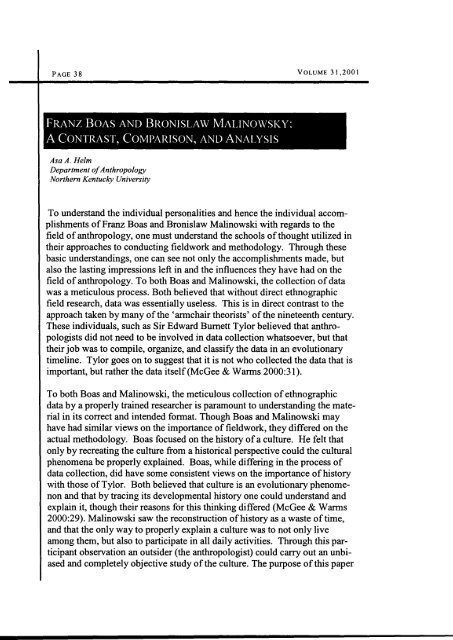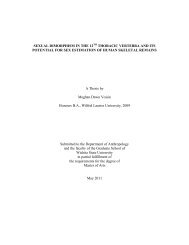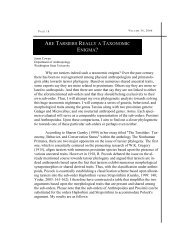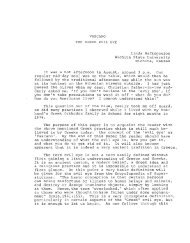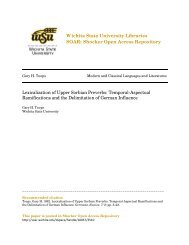FRANZ BOAS AND BRONISLAW MALINOWSKY: A ... - Soar
FRANZ BOAS AND BRONISLAW MALINOWSKY: A ... - Soar
FRANZ BOAS AND BRONISLAW MALINOWSKY: A ... - Soar
You also want an ePaper? Increase the reach of your titles
YUMPU automatically turns print PDFs into web optimized ePapers that Google loves.
<strong>FRANZ</strong> <strong>BOAS</strong> <strong>AND</strong> <strong>BRONISLAW</strong> <strong>MALINOWSKY</strong>:<br />
A CONTRAST, COMPARISON, <strong>AND</strong> ANALYSIS<br />
AsaA. Helm<br />
Department of Anthropology<br />
Northern Kentucky University<br />
To understand the individual personalities and hence the individual accomplishments<br />
of Franz Boas and Bronislaw Malinowski with regards to the<br />
field of anthropology, one must understand the schools of thought utilized in<br />
their approaches to conducting fieldwork and methodology. Through these<br />
basic understandings, one can see not only the accomplishments made, but<br />
also the lasting impressions left in and the influences they have had on the<br />
field of anthropology. To both Boas and Malinowski, the collection of data<br />
was a meticulous process. Both believed that without direct ethnographic<br />
field research, data was essentially useless. This is in direct contrast to the<br />
approach taken by many of the 'armchair theorists' of the nineteenth century.<br />
These individuals, such as Sir Edward Burnett Tylor believed that anthropologists<br />
did not need to be involved in data collection whatsoever, but that<br />
their job was to compile, organize, and classify the data in an evolutionary<br />
timeline. Tylor goes on to suggest that it is not who collected the data that is<br />
important, but rather the data itself (McGee & Warms 2000:31).<br />
To both Boas and Malinowski, the meticulous collection of ethnographic<br />
data by a properly trained researcher is paramount to understanding the material<br />
in its correct and intended format. Though Boas and Malinowski may<br />
have had similar views on the importance of fieldwork, they differed on the<br />
actual methodology. Boas focused on the history of a culture. He felt that<br />
only by recreating the culture from a historical perspective could the cultural<br />
phenomena be properly explained. Boas, while differing in the process of<br />
data collection, did have some consistent views on the importance of history<br />
with those ofTylor. Both believed that culture is an evolutionary phenomenon<br />
and that by tracing its developmental history one could understand and<br />
explain it, though their reasons for this thinking differed (McGee & Warms<br />
2000:29). Malinowski saw the reconstruction of history as a waste of time,<br />
and that the only way to properly explain a culture was to not only live<br />
among them, but also to participate in all daily activities. Through this participant<br />
observation an outsider (the anthropologist) could carry out an unbiased<br />
and completely objective study ofthe culture. The purpose of this paper
is to analyze, compare, and contrast the different methodologies and data<br />
collection techniques of Franz Boas and Bronislaw Malinowski. Both of<br />
these men were and still are extremely prominent and important anthropological<br />
figures, and their influences within the field of anthropology are invaluable.<br />
Through these explanations, one will realize and begin to understand<br />
the different schools of thought (American and British primarily) and<br />
how and why they influence perceptions still to this day.<br />
Background<br />
Franz Boas (1858-1942), a well known and highly thought of anthropologist<br />
is sometimes referred to as the father of American anthropology. He grew up<br />
a German born Jew under the roof of a prosperous businessman and a somewhat<br />
unusual, but civically active mother who founded the first Froebel Kindergarten.<br />
He spent the first nineteen years of his life in this environment,<br />
where he took an interest in botany and various other natural sciences<br />
(Kroeber 1943:5), which would later play greatly into his research methods.<br />
His academic career continued at universities in Heidelburg and Bonn where<br />
he studied geography and physics. He continued on to obtain his doctorate at<br />
Kiel in 1881. His dissertation, "Contributions to the Understanding of the<br />
Color of Water", dealt with the absorption, reflection, and the polarization of<br />
light in seawater (Kroeber 1943:5). Bohannon and Glazer with regards to<br />
Boas' transition to anthropology state:<br />
A staunch believer in the value of first-hand information, he decided<br />
in 1883 to undertake a geologic expedition to investigate seawater<br />
under Arctic conditions. His year-long stay with the whalers<br />
and Eskimos turned Boas into an ethnographer and convinced him<br />
that the knowledge gained by mere observation is useless without understanding<br />
the traditions that condition the perceiver. This realization,<br />
along with the warm friendships of his Arctic hosts, precipitated<br />
what was to become his life-long interest - field research as a royal<br />
road to anthropology (1973:81).<br />
No sooner than did Boas accept a position in geography at the University of<br />
Berlin in 1886, when he became 'inspired by a group of visiting Bella Coola<br />
Indians' that prompted the beginnings of his lifelong study of indigenous<br />
peoples ofthe Northwest Coast (Bohannon and Glazer 1973:81). After a<br />
year of fieldwork in British Columbia, Boas returned to Germany, married,<br />
and decided to become an American (Bohannon and Glazer 1973 :81 and<br />
Lowie 1937:129). Amongst his fieldwork with the British Columbia tribes,<br />
Boas obtained his first position in the United States at Clark University in
1889. He left his position at Clark and from 1892-1894 he worked on the anthropological<br />
exhibits at the Chicago World's Fair, which he left due to personal<br />
conflicts. From Chicago, Boas moved to the American Museum of<br />
Natural History in New York (where he again was forced to resign due to<br />
further personality conflicts) and soon began teaching at Columbia University<br />
where he stayed until he retired in 1936 (Lowie 1937:129). There is<br />
some discrepancy with regard to the ability of Boas' teaching. Though he<br />
trained a generation of 'brilliant and productive anthropologists' such as A.L.<br />
Kroeber, Paul Radin, and Edward Sapir, his lectures were seen as less than<br />
desirable by many (Bohannon and Glazer 1973:82). Franz Boas was a stubborn,<br />
ifnot abrasive man towards many with the exceptions of his family and<br />
closest, most talented students with which he was a warm and caring man.<br />
The scars on his face are reportedly from several dueling encounters he had<br />
while in college (quite possibly due to problems associated with him being of<br />
Jewish descent), but on more than one occasion he claimed them to be from<br />
polar bear clawing (Bohannon and Glazer 1973:81).<br />
Bronislaw Malinowski (1884-1942) was born to an aristocratic and cultured<br />
family in Krakow, Poland. This environment provided him with a multilingual<br />
background and taught him a sense of worldliness. He received a doctorate<br />
with honors from the University of Krakow in mathematics and physics<br />
in 1908 (Voget 1975:513). Shortly thereafter, Malinowski was stricken<br />
with tuberculosis, and it is during his recovery time that he became enthralled<br />
with the field of anthropology. During his recovery he read Frazer's<br />
The Golden Bough as his "first attempt to read an English masterpiece in the<br />
original", and this was his inspiration (Bohannon and Glazer 1973:272).<br />
In 1910, Malinowski began his anthropological graduate work at the London<br />
School of Economics where he later obtained a doctorate in 1916. It is during<br />
these years that Malinowski is introduced to the people ofMailu and the Trobriand<br />
Islands with whom he would later spend a great deal of time researching<br />
(Bohannon and Glazer 1973:272 and Voget 1975:513-514). Malinowski<br />
was in the field when Wodd War I broke out, and being an Austro-<br />
Hungarian national, technically was considered to be an enemy-alien. With<br />
common sense and cool heads prevailing, Malinowski was permitted to remain<br />
in the field instead of being detained. It is during these years that he<br />
gathered the majority of his information on the Trobriand Islanders from<br />
which his many classics were based (Bohannon and Glazer 1973:273). Upon<br />
his return to Australia in 1918, Malinowski married Elsie Masson, the daughter<br />
of a University ofMelboume professor.
One can see the effects of his separation from his now published private diary<br />
that he was depressed a great majority ofthe time and suffered both psychologically<br />
and physically, patterns that would trouble him for the remainder of<br />
his life (Bohannon and Glazer 1973:273). In 1921, he began teaching at the<br />
London School of Economics, where he later became the school's first professor<br />
of anthropology. Malinowski's teaching abilities were exceptional,<br />
and like Boas, he too trained an entire generation including E. E. Evans-<br />
Pritchard and Raymond Firth (Bohannon and Glazer 1973:273). Firth says<br />
that "almost more than anything else, Malinowski was a great teacher." He<br />
says that Malinowski was a gifted, inspiring, and perceptive man in addition<br />
to his complex and highly intelligent personality (1957:7-8). He was in the<br />
United States when World War II broke out and stayed there until his death<br />
in 1942. While in the U.S., he did work with the Zapotec Indians in Oaxaca,<br />
Mexico during summer vacations and was appointed as a professor at Yale<br />
shortly before his death (Firth 19572-9).<br />
Schools of Thought & Methodologies<br />
Having a basic understanding of the backgrounds ofthese two individuals,<br />
one can now move forward and with more confidence begin in the process of<br />
understanding their schools of thought and approaches to fieldwork. Both<br />
Boas and Malinowski started out within the field of the physical sciences and<br />
were educated in Germany and Poland respectively, but the majority oftheir<br />
influences within the anthropological field were made in the United States<br />
and England (Bamouw 1971:38). With these similarities one can see how and<br />
why their ethnographic research was performed with such detail and complexity.<br />
Even though there were some similarities between these two prominent<br />
anthropological figures, the differences in their processes and methodologies<br />
were at times notable.<br />
Franz Boas - The Historical Method and Natural History Approach<br />
Boas' early experiences on Baffin Island led him to the conclusion that would<br />
stick with him and dominate his anthropological career. According to<br />
Bamouw, this conclusion showed Boas that:<br />
Geography plays a mainly limiting rather than creative role. The<br />
Eskimos did things in spite of their environment, not just because of<br />
it; they had a particular history and set of traditions behind them<br />
which were different from those of other northerly peoples, such as<br />
the Siberian Chukchee, who lived in a similar environment. A culture<br />
is shaped by many historical forces, including contacts with other societies<br />
(1971 :39).
Boas felt that the 19 th century cultural evolutionists made premature generalizations<br />
based on poor and inadequate information. This information was obtained,<br />
not from a qualified researcher, but rather from individuals ''who often<br />
had only a biased, superficial understanding of the people they were observing"<br />
and provided more conjecture than fact (Barnouw 1971:39). Boas (and<br />
later, his students) made it a point to criticize these views and methods and<br />
said that we must first get the facts in order to build a reliable body of ethnographic<br />
data from which better generalizations then can be made. Boas used<br />
all fields of anthropology to ascertain proper information in the proper context.<br />
This full-bodied approach allowed Boas to reconstruct "the history of<br />
the growth of ideas with much greater accuracy than the generalizations of a<br />
comparative method" (Hyatt 1990:43).<br />
Cultures to Boas were unique and entirely separate entities, and therefore<br />
could in no way, shape, or form be compared to another even ifunder similar<br />
social, economic, and environmental conditions. Boas wanted to study each<br />
culture in its entirety rather than in bits and pieces. By studying a unique culture<br />
in its entirety; by investigating customs, language, social systems, and by<br />
even collecting physical measurements, one can understand a cultures' psychology.<br />
Hyatt goes on to say that ,"merging these together, the anthropologist<br />
could then penetrate the 'psychological factors' that shaped a culture and<br />
ascertain the extent to which 'historical connections' contributed to the lifestyle<br />
of a given society" (1990:43).<br />
Boas' early viewpoints on culture showed he thought very little of the individual<br />
on the whole. This is in direct opposition to Malinowski's views, but over<br />
time Boas changed his views somewhat, though not to the extent of Malinowski's.<br />
This created a rift between his followers on the importance of the<br />
individual within a society (McGee and Warms 2000:137). This view<br />
changed in part due to his realization that whether or not the person was<br />
"typical" to his/her society, the society or culture therein has boundaries set<br />
up to keep individuals within the norms of what is and what is not acceptable<br />
to them. Boas used this also as a crutch supporting his view on the collection<br />
of data from informants. He felt that he could obtain all the knowledge<br />
needed to understand a culture from a few key people. This is in part also to<br />
the fact that one can only obtain knowledge from persons willing to or having<br />
the time to dispense it (Goldschmidt 1959:58-59).
Bronislaw Malinowski - Functionalism, Participant Observation<br />
and the Individual<br />
"The archfunctionalist of anthropology, Malinowski is regarded as a founder<br />
of modern functionalism in anthropology" (Bohannon and Glazer 1973:274).<br />
His ideas of functionalism point to the needs ofthe individual in turn become<br />
the needs of the society. Bohannon and Glazer comment that,<br />
Malinowski's functionalism is founded on what he regards as the<br />
seven basic needs of man: nutrition, reproduction, bodily comforts,<br />
safety, relaxation, movement, and growth. The individual needs are<br />
satisfied by derived cultural and social institutions, whose functions<br />
are to satisfy those needs. In other words, every social institution has a<br />
need to satisfy, and so does every cultural item. Malinowski's view of<br />
culture is also based on human biosocial needs - he regards culture as a<br />
tool that responds to the needs of human beings in a way that is above<br />
any adaptation (1973:274).<br />
This particular view of functionalism, unique to Malinowski, shows that<br />
"various cultural beliefs and practices contributed to the smooth functioning of<br />
the society while providing individual biological or psychological benefits"<br />
(McGee & Warms 2000: 158). The individual was imperative because it<br />
is the individuals who make up the group. These individuals therefore are<br />
good representations of the group because it is they who perform the daily activities,<br />
rituals, and so on. This is the key to understanding a culture according<br />
to Malinowski. Malinowski, like Boas, believed that only through comprehensive<br />
and detailed fieldwork could a proper ethnography be done. He actively<br />
hunted for information using a variety of techniques and was renowned for his<br />
detail in data collection, but did not feel that such data was sufficient, no matter<br />
how detailed. To him, only by working side by side, doing the things the<br />
natives do could an ethnographer understand the subtleties of a culture that<br />
would otherwise remain unseen (Firth 1957:78-79). Sir James Frazer further<br />
points out in the preface of Argonauts of the Western Pacific the thoroughness<br />
of Malinowski's fieldwork and his ability to see within a culture:<br />
It is characteristic of Dr. Malinowski's method that he takes full account<br />
of the complexity of human nature. He sees the man, so to say,<br />
in the round and not in the flat. He remembers that a man is a creature<br />
of emotion at least as much as of reason, and he is constantly at pains<br />
to discover the emotional as well as the rational basis of human action<br />
(1922:ix).
Critics and Contributions<br />
No matter what influence Franz Boas had on the field of anthropology, he<br />
still had his critics. Boas refused to theorize about developing anthropologicallaws<br />
and was seen by some as a hindrance and a detriment to the field.<br />
He was focused on precise methodology and a strict scientific method. He<br />
was concerned about the reconstruction of history, not with the formation of<br />
laws derived from it (Hyatt 1990:44). Boas did not technically leave behind<br />
a "school of thought", but rather a handful of individuals trained by him and<br />
left to develop and make their own decisions for better or for worse (Voget:<br />
1975:337). Not only did Boas use the four-field approach in his fieldwork<br />
(cultural, archaeology, physical/biological, and linguistics), but also in his<br />
everyday life. Boas combated racism the majority of his life, and I feel that<br />
this was a compelling factor in his becoming an anthropologist. He used his<br />
position and expertise on more than one occasion to fight racism on all fronts<br />
and this agenda continued on until his death. Having been born into a Jewish<br />
family in Germany and seeing the rise of Hitler's Nazi party in the 30s and<br />
40s further provoked his feelings on this matter.<br />
Malinowski's field research was thought by many to be a wonderful example<br />
of completely unbiased work by an extraordinary anthropologist. While it<br />
very well may be a wonderful collection of detailed data, it was hardly unbiased.<br />
While he was doing fieldwork in the South Pacific, he battled periods<br />
of depression and anger pointed towards the indigenous peoples. His diary<br />
(1967) repeatedly shows slanderous and racial remarks towards informants<br />
and his constant reliance upon the needle to battle his depression and lonesomeness.<br />
These discoveries came as a great shock to many within the anthropological<br />
community upon the release of his diaries. The amazing thing<br />
about Malinowski's biases is that he was completely aware of them and took<br />
the appropriate measures to ensure they did not interfere with his fieldwork.<br />
Not only did he do this, but he was also his own hardest critic.<br />
Malinowski considered it the duty of the anthropologist to render a<br />
careful and sincere account of his credentials and his mistakes in the<br />
field; and in Appendix II to Coral Gardens, he recorded his<br />
'Confessions of Ignorance and Failure'. He admitted that a general<br />
source of inadequacies in all his material, whether photographic or<br />
linguistic or descriptive, consisted in the fact that, like every ethnographer,<br />
he was lured by the dramatic, exceptional, and sensational;<br />
and he castigated himself for not treating the 'drab, everyday, minor
events with the same love and interest as sensational, large-scale happenings'<br />
(1957:79).<br />
Conclusion<br />
Nearly sixty years after their deaths, which coincidently both happened in<br />
1942, Franz Boas and Bronislaw Malinowski still continue to be central to<br />
the discipline of anthropology. The approaches, schools of thought, and<br />
methodologies introduced by Boas and Malinowski are still paramount to the<br />
field. This was seen at an early time when A.R. Radcliffe-Brown described<br />
the emergences of these trends in 1929. He said there were two different and<br />
opposing tendencies in the study of culture. One being the American based<br />
view of Franz Boas, which he called the most popular. This regards culture<br />
purely from the historical standpoint, and "attempts, in the absence of any<br />
historical records, to multiply and elaborate hypothetical reconstructions of<br />
an unknown past." The second view, associated with the British and Malinowski,<br />
had to do with treating each culture as a "functionally interrelated<br />
system and to endeavor to discover the general laws of function for human<br />
society as a whole." He goes on to say, "It does not neglect the historical<br />
point of view, but regards the processes of social change as something to be<br />
studied by actual observation over a period, or by the use of authentic and detailed<br />
records." This process accepts history but rejects hypothetical history<br />
(Naroll & Naroll1973:187).<br />
Whether or not Boas or even Malinowski would have accepted this point of<br />
view is inconsequential. The fact of the matter is that the point was made<br />
about the differences in method. To say one is better than the other is not<br />
only impractical, but also irrelevant. No one way of doing something can be<br />
entirely right or entirely wrong. So is the case with this. People use things to<br />
their liking, or as the use suits them, and ethnography is not (at least shouldn't<br />
be) any different.<br />
It is unfortunate in my eyes that there is no adequate way in comparing these<br />
two men other than the format given; that is the broken manner in which material<br />
is presented. There is no format that allows such detail to be commingled<br />
with other information without confusion or repetition setting in, hence<br />
the reason I have chosen to separate these two men and their methodologies<br />
into different sections and allow the reader to compare, contrast, or ignore the<br />
information presented in the manner they see fit. By no means is this an adequate<br />
representation of the importance of such anthropological greats as
Franz Boas and Bronislaw Malinowski. It is however an attempt at shedding<br />
some light on their roles and contributions within the field of anthropology to<br />
not only the layperson, but also the professional.<br />
Barnouw, Victor<br />
1971 An Introduction to Anthropology. Volume Two - Ethnology. The Dorsey<br />
Press, Homewood, Illinois.<br />
Bohannon, Paul & Glazer, Mark<br />
1972 High Points in Anthropology. Alfred A. Knopf, Inc., New York.<br />
Firth, Raymond<br />
1957 Man & Culture - An Evaluation of the Work of Bronislaw Malinowski.<br />
Humanities Press, New York.<br />
Goldschmidt, Walter<br />
1958 The Anthropology of Franz Boas - Essays on the Centennial of His Birth, in<br />
American Anthropologist, Memoir NO. 89. The American Anthropological Association,<br />
New York.<br />
Hyatt, Marshall<br />
1990 Franz Boas, Social Activist - The Dynamics of Ethnicity. Greenwood Press,<br />
New York.<br />
Kroeber, A. L.<br />
1943 Franz Boas - 1858-1942, in American Anthropologist. Vol. 45 July-September,<br />
1943. The American Anthropological Association, New York.<br />
Lowie, Robert H.<br />
1937 The History of Ethnological Theory. Holt, Rinehart and Winston, New York.<br />
Malinowski, Bronislaw<br />
1922 Argonauts of the Western Pacific. Routledge, London.<br />
McGee, R. Jon & Warms, Richard L.<br />
2000 Anthropological Theory - An Introductory History, Second Edition.<br />
Mayfield Publishing Company, London.
Naroll, Raoul and Frada Naroll<br />
1973 Main Currentsin CulturalAnthropology. Prentice-Hall, Inc., Englewood<br />
Cliffs, New Jersey.<br />
Voget, Fred W.<br />
1975 A History of Ethnology. Holt, Rinehart and Winston, New York.


